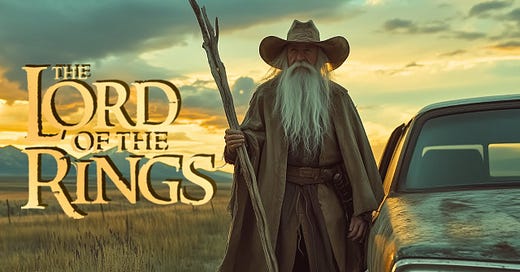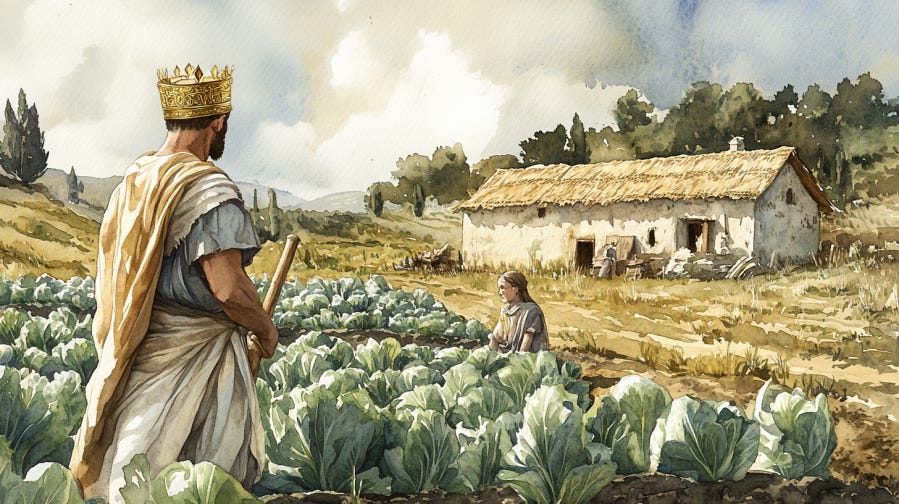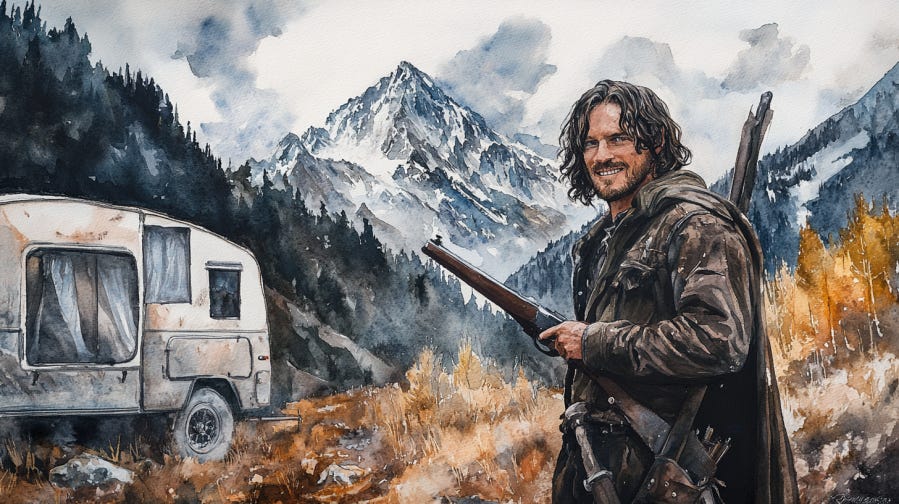Fellowship of the Rednecks and the Spirit of Tolkien
How a 2-minute AI generated video expresses Tolkien better than a billion dollar Amazon production, and the peoples' revolts across the West
This is a tail of two artistic adaptations: One, an autistic AI generated kludgy mess, and the other a billion dollar multi-season production. Both exist solely as proxies to a long-running cultural franchise. It was the best of art, it was the worst of art.
I ran into a video a few months ago… It was a fun example of what AI tools can do: generate art, music, and create a setting or riff on an already existent property. The video itself is silly and fun to watch for 2 minutes while doomscrolling. Then after catching an episode of Rings of Power by accident, I realized that this silly 2 minute AI generated youtube video has a stronger spiritual connection to Tolkien’s literature than million dollar Amazon writers.
Watch it if you haven’t seen it online already.
In comparison to a billion dollar television production, the Fellowship of the Rednecks, looks shoddy. Dirty craftsmanship, slapped together images, not even a single real actor and an AI generated soundtrack. It was something put out into the ether because some one thought it would be funny. The Rings of Power on the other hand, is professional with digital special effects, sleek and polished, perfectly preened actors. Yet the Rings of Power, even in its promotional artwork, lacks completely in soul. A board-room approved anti-art designed to take up intellectual and cultural space like an inflated balloon. There’s nothing inside.
The Lord of the Rings is a core spiritual totem of the West. As Rudyard Lynch would say, the Lord of the Rings is the best book of the last century. One could call Lord of the Rings a capstone to the history and spirit of the West. Lord of the Rings exists in the context of the British Empire and Great War as viewed through a fantasy lens. It’s about war, friendship, heroism, and loss. It’s about real stakes and the little people at the bottom of society on whom Fate ultimately rests. Be it in the trenches of the Great War, the literal little-people of the Shire in the novels, the men flying drones in Ukraine, or starving Jihadis in Palestine taking potshots at Israeli invasion forces. At the end of the day, it’s a billion split-second decisions among the men in the trenches that decide the course of history.
While there are Kings and Lords and Wizards and Heroes interspersed throughout the Lord of the Rings, they’re not what the material is about. Rather, what Tolkien’s work is about is some nobody farm boy drafted into the British Empire or the trenches in France. He wasn’t a noble or a hero, he was doing what he believed to be right in extraordinary circumstances. Tolkien lived through an incredible period of history, where ancient tradition rammed into the industrial revolution creating cultural shockwaves still shaking the earth today.
Imagine being a farm boy from a small town in the British Isles. You’d likely never ventured too far out of your own village. Your family, friends, nearly all the people you’ve ever met are from your 1800s hamlet. Then one day you join the Royal Navy and, having an aptitude for it, quickly climb the ranks. In your mid 20s, your captain is killed in a skirmish and you’re promoted. The East India company hires you to command some of their trade ships. One thing leads to another and for a year or two, you’re the ruler of a city of a half million people in a trade port in India.
At heart, you are still some half-educated lad from Malton. You grew up thinking you’d be a farmer like your father, or maybe a blacksmith. You trained in how to castrate cattle and butcher pigs. Yet here you are, acting ruler under the British crown for an entire region filled with complex people and a foreign culture. What do you do with all this power?
For most of them… they eventually retired, they went back to their villages and told tales about the things they’d seen. They told their children about the lessons they’d learned, the horrors they’d seen, how they lost an arm in battle and the strange beautiful women of the far east.
They just went home. These weren’t lords or kings or crusaders, they were regular folk who rose to prominence and then went back home at the end of it. They completed their journeys. In so doing, they rejected the corrupting influence of the power they’d been given. They didn’t vie to create crusader states. At the end of the day, they went home and got married and had kids. These small people found peace in a way few that Lords or Kings have.
The simplistic virtues of simple people are what Tolkien wrote about.
At it’s heart, Tolkien is about the ordinary peasant becoming extraordinary by luck, circumstance, and an incorruptible moral clarity. Lord of the Rings is about the corruptive effects of power as embodied by the One Ring. No king or lord can possess the Ring without becoming corrupted by it. Even Aragorn, one of the most morally stalwart characters in all of fiction, fears the Ring. That fear is well-founded.
Now in the 21st century, we see what ultimate power might do in the hands of godlike Tech elites, the Men of Davos and the World Economic Forum, and [international financiers]. It’s a terrible and crushing thing to behold. Corruption and the centralization of global financial power is a subtle thing that works its way into the hearts of already powerful men. That type of cultural globalism will destroy entire cultures if permitted. A black fortress from which totalitarian destruction manifests either incidentally or through intent.
Tolkien is about the fact that those with a taste for power are doomed find themselves corrupted by it. Simultaneously, it is those men who seek and attain power; a poor combination. Yet the peasant, the farmers boy from Malton, has the ability to let the Ring go. Samwise, here’s looking at you. Letting go of the Ring, a feat near-impossible for a king, can be accomplished by simple men. The little people that want to go back to a farm when their tenure is ended. Hobbits as
would say.The little people do not lead, they are drawn to action by circumstance. They do not martial forces, they are martialed by powers greater than themselves; kings, and the titanic shifts of civilization through time. What makes the little people in the world of Tolkien unique is that they can reject even the most seductive aspects of evil. This is a moral paradigm expressed by heroic characters like Superman and Captain America. Yet in Tolkien’s work, that rejection of the corrupt more fundamental. It is a rejection not from a heroic aversion to avarice, nor as a superhuman aspect of the over-man as in the philosophy of Nietzsche. It is a rejection of corruptive power for the sake of simplicity by the simple-minded.
A grug-brained take on power, but it seems, necessarily so.
As a result, Tolkien has become one of the most studied authors in history. His work has grown into a vast philosophical and financial enterprise. Ironically, the later generations of his estate were unable to do the very thing that their elder espoused. They have been seduced by the corruptive influence of wealth and power. By licensing continued iterations, they condemn to slow destruction their patriarchs creation: The books that warn of that very vice and ennoble those who reject it.
There’s a certainty in the moral ethos of the farmer. The man of the land who does not wish to be a king or a knight or a hero. The ability to lay down ones arms and go home is something that this spiritually bereft era longs for: Hiraeth. The entirety of managerial society seems orchestrated to prevent the little man from ever being put in a position where he might upset the system by occasionally doing the right thing.
This is why the current(2024) farmer revolts across Europe, the Netherlands and the UK, are important. It’s because, having finally been roused to action by larger political figures and social forces like Jeremy Clarkson, the overlooked village folk are finally engaged to act. They’re unpredictable because the majority are actors of moral character, not actors of political convenience. Thus, the European elites are hell-bent on crushing these upstarts the way the Soviet Union crushed them in the early 20th century.
The modern American version of the Shire isn’t a farming village in quiet fields with rolling hills. The United States has created its own underclass of overlooked people that have their own ways of doing things. While media elites would have you believe that life exclusively takes place in New York and LA, the truth is that the American spirit lies with ranchers and farmers, in trailer parks and low income housing. In the Bayou of the South and the Great Plains nestled up to the Rocky Mountains.
That’s why this stupid 2 minute youtube video using AI music and imagery is so damn compelling. That’s why people we are here talking about it months after it was first published. Lord of the Rings, the Rings of Power is nothing but slop created to pull a few dollars and occupy cultural space. Fellowship of the Rednecks is an Americanized piece of art that understands and shares the spirit of Tolkien’s work. It is not cosmopolitans that make up the rough-hewn spirit of the West. Fate ultimately rests on a billion decisions by millions of little people drafted to action.
In fictional adaptations, the setting, characters, and even genre may shift to retain the spirit of the material. This is a fact self-evidently obvious in the genre of Soviet Fiction: Roadside Picnic, S.T.A.L.K.E.R. the film and S.T.A.L.K.E.R. the videogame are radically different in character, setting and background. Yet the spirit of the material remains the same through each iteration. Translating a story as philosophically complex as Lord of the Rings from book to film required deep consideration of the materials’ soul.
Amazon’s Rings of Power is a TV series that wears a skin-suit to appear as if it were Lord of the Rings. Woke progressives wrote it and, as Tolkien himself says:
“Evil cannot create anything new. They can only corrupt and ruin what good forces have invented or made.”
The Rings of Power has the set-dressing of Lord of the Rings. The television series has some of the characters and the right setting and makeup. It has the tall mountains and fantasy magic. It pretends to be “Lord of the Rings” but completely lacks the spiritual soul of the art. It lacks Tolkien’s affirmation to the small peoples of the West. Not kings or heroes, but simple men doing what they can when fate carries them far from home. In that way, the Rings of Power is spiritually anti-Tolkien as it was created by powerful corrupt interests for powerful corrupt purposes.
This is why works like Murdoch Murdoch remain compelling with shoddy animation and no budget. The spirit of the material is true to itself. Truth must come first in art, while aesthetics are in service to it. A strong soul to an artwork can be compelling even while aesthetic acumen is limited. A soulless husk of an artwork can have the best aesthetics money can buy but will be soulless, forgettable and culturally irrelevant.
Thus is the 2 minute brain-child of a single autist, slapped together with crude editing, more emotionally and philosophically compelling than a billion dollar production crafted by the most powerful company on the planet. A little film about the little people of the United States as viewed through the lens of fantasy.









Generally, I think AI stuff is slop. But this is an exception. And I think you have it dead on, referencing the spirit of the root material.
I lurk in a community that came together over the horror of what Amazon did to Wheel of Time. Utterly failing to preserve the spirit, and couldn't resist injecting stuff that wasn't in the original material, and making change after change after change, to the point it contains only a few shreds of flesh that could be called "Wheel of Time." That same spirit of argument applies to Rings of Power. It doesn't understand what it's adapting at all.
half-educated lad from Malton
It's funny, Malton is a heavily Sikh suburb now.
I know because it was the site of riots between Hindus & Sikhs a few weeks back.
Near Toronto
edit -
Also, a story with a female lead is like cuck porn.